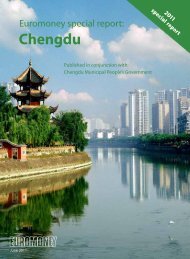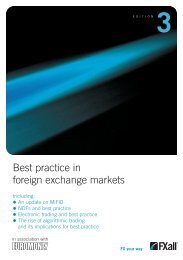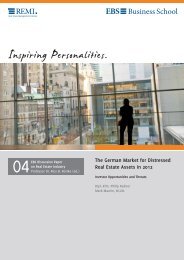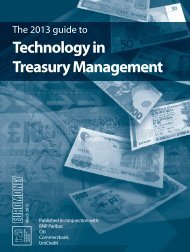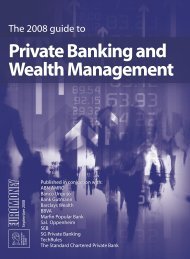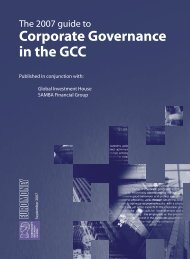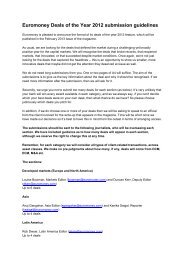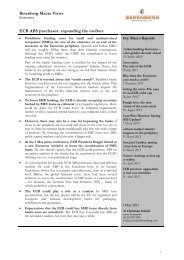You also want an ePaper? Increase the reach of your titles
YUMPU automatically turns print PDFs into web optimized ePapers that Google loves.
Distribution holds <strong>the</strong> key<strong>Asset</strong> managers around <strong>the</strong> world recognize <strong>the</strong> opportunities that exist <strong>in</strong> <strong>the</strong> Gulf. What <strong>the</strong>y stillhave to come to grips with is exactly how to exploit those opportunities most effectively“There is a huge opportunity <strong>in</strong> <strong>the</strong> Gulf, that’s pretty much widely recognizedby everyone,” says William Wells at Schroders. “But how best totackle it is ano<strong>the</strong>r matter.” And <strong>the</strong> biggest question for foreign managers<strong>in</strong> work<strong>in</strong>g that out is distribution.Decid<strong>in</strong>g on a distribution strategy requires a clear understand<strong>in</strong>g of <strong>the</strong>dist<strong>in</strong>ct client bases <strong>in</strong> <strong>the</strong> Gulf, and what those clients want.Scott Callander, director, Middle East Institutional Advisory,AXA Investment ManagersFor most foreign asset managers, <strong>the</strong> sovereign wealth funds are <strong>the</strong>ma<strong>in</strong> prize. “That’s currently <strong>the</strong> majority of <strong>the</strong> bus<strong>in</strong>ess we have, andmost <strong>in</strong>ternational asset managers would be <strong>the</strong> same,” says Wells. Formany, it’s becom<strong>in</strong>g a still bigger focus. “A good period of time is be<strong>in</strong>gspent on sovereign wealth funds, right now even more than <strong>in</strong> <strong>the</strong> past,”says a Middle East asset <strong>management</strong> head at a major European bank.“They’re act<strong>in</strong>g as liquidity providers and are more aggressive than anyoneelse right now. The top five to 10 addresses <strong>in</strong> <strong>the</strong> Gulf make up <strong>the</strong>bulk of our bus<strong>in</strong>ess.” But what do <strong>the</strong>se mega-clients want?There are sovereign funds <strong>in</strong> four nations that really matter <strong>in</strong> <strong>the</strong> Gulf,and <strong>the</strong>y differ <strong>in</strong> <strong>the</strong>ir approach and requirements. At <strong>the</strong> top of <strong>the</strong>pile is <strong>the</strong> Abu Dhabi Investment Authority (ADIA), <strong>the</strong> richest by farof <strong>the</strong>m all and probably <strong>the</strong> largest <strong>in</strong>stitutional <strong>in</strong>vestor <strong>in</strong> <strong>the</strong> world,with perhaps as much as $1 trillion under <strong>management</strong> (nobody knowsfor sure but a commonly cited figure is $875 billion, quoted last year byboth Deutsche Bank and Morgan Stanley). ADIA is known as be<strong>in</strong>g highlysophisticated, and ra<strong>the</strong>r aggressive relative to its peers, particularly <strong>in</strong>private equity; it takes an <strong>in</strong>ternational approach to its staff<strong>in</strong>g, ra<strong>the</strong>rthan be<strong>in</strong>g dom<strong>in</strong>ated by UAE nationals. It has over <strong>the</strong> years been anearly mover <strong>in</strong>to areas like emerg<strong>in</strong>g markets and hedge funds, andhas a highly sophisticated system for analys<strong>in</strong>g and select<strong>in</strong>g potentialmanagers. “They have more closely associated <strong>the</strong>mselves with a USendowment like a Harvard than <strong>the</strong>y would a central bank,” says DouglasHansen-Luke at Robeco <strong>in</strong> Bahra<strong>in</strong>.Then <strong>the</strong>re’s <strong>the</strong> Kuwait Investment Authority, set up <strong>in</strong> 1953 and <strong>the</strong> oldestsovereign wealth fund <strong>in</strong> <strong>the</strong> region, for whom <strong>the</strong> most commonlyquoted figure from analysts is $200 billion–250 billion under <strong>management</strong>(aga<strong>in</strong>, it has never been disclosed). The KIA is also consideredamong <strong>the</strong> more professional of <strong>the</strong> sovereign funds, with a very strong<strong>in</strong>-house tra<strong>in</strong><strong>in</strong>g programme and a record of employ<strong>in</strong>g <strong>the</strong> brightestpeople <strong>in</strong> <strong>the</strong> country. Until recently it had a track record for conservatismbut is <strong>in</strong> <strong>the</strong> midst of implement<strong>in</strong>g a much more market-savvyapproach today (though one wonders how it has fared <strong>in</strong> this globalenvironment). A review by an <strong>in</strong>ternational consultant <strong>in</strong> August 2004,approved by KIA’s board <strong>the</strong> follow<strong>in</strong>g June, has led to <strong>the</strong> fund establish<strong>in</strong>ga target rate of return that would see it double its assets under<strong>management</strong> with<strong>in</strong> 10 years. Among o<strong>the</strong>r th<strong>in</strong>gs, this review broughtabout <strong>the</strong> creation of a separate division for alternative <strong>in</strong>vestments. TheKIA is perhaps <strong>the</strong> <strong>in</strong>stitution most likely to outsource mandates to overseasmanagers; ADIA does so too but with reportedly a greater desire tohandle as much as possible <strong>in</strong>-house.Saudi Arabia differs <strong>in</strong> that it doesn’t have a s<strong>in</strong>gle overall sovereign fund,but several <strong>in</strong>stitutions which between <strong>the</strong>m amount to about $300 billionunder <strong>management</strong> and all <strong>in</strong>vest <strong>in</strong> <strong>the</strong> name of <strong>the</strong> state (<strong>the</strong> twomost prom<strong>in</strong>ent would be <strong>the</strong> General Organization for Social Insuranceand <strong>the</strong> Saudi Arabian Monetary Authority). These are considered muchmore conservative; some managers believe as much as 70% of <strong>the</strong> <strong>in</strong>vestmentsfrom some of <strong>the</strong>se <strong>in</strong>stitutions are <strong>in</strong> US dollar fixed <strong>in</strong>come,chiefly government paper.And Qatar is <strong>the</strong> newer entrant, launched only <strong>in</strong> 2005 (reflect<strong>in</strong>g <strong>the</strong>more recent arrival of wealth <strong>in</strong> Qatar, predicated ma<strong>in</strong>ly on <strong>the</strong> remarkablyfortuitous discovery of <strong>the</strong> third largest natural gas reserves <strong>in</strong> <strong>the</strong>world <strong>in</strong> a country smaller than Connecticut). It may already have asmuch as $70 billion under <strong>management</strong> already, and has become quite acelebrity <strong>in</strong> world markets already after its tilt for <strong>the</strong> British supermarketcha<strong>in</strong> J Sa<strong>in</strong>sbury, accentuated by high-profile purchases of 23.5% of <strong>the</strong>London Stock Exchange.So what do <strong>the</strong>se groups want from <strong>the</strong>ir fund managers, and howshould <strong>the</strong>y be approached? Despite high-profile stakes <strong>in</strong> big western<strong>in</strong>stitutions – KIA <strong>in</strong>to BP, DaimlerChrysler, Merrill Lynch and ICBC; ADIA<strong>in</strong>to Citibank – <strong>the</strong>y are reasonably conservative groups. “Their currentconcern is <strong>the</strong> preservation of capital, particularly for <strong>the</strong> Saudis andKuwaitis,” says Hansen-Luke. “But over <strong>the</strong> longer term <strong>the</strong>y have a will<strong>in</strong>gnessto make less liquid <strong>in</strong>vestments such as private equity, because<strong>the</strong>y view <strong>the</strong>mselves as fund<strong>in</strong>g <strong>the</strong> next generation.”The private equity <strong>the</strong>me turns up time and aga<strong>in</strong>. “We see more andmore private equity-like behaviour,” says Scott Callander at Axa. “As <strong>the</strong>y<strong>in</strong>crease <strong>the</strong>ir assets under <strong>management</strong> <strong>the</strong>y need to adopt additionalnon-correlated strategies to deploy <strong>the</strong>ir assets. They are mature andresponsible <strong>in</strong>vestors and I th<strong>in</strong>k <strong>the</strong> potential barriers that are be<strong>in</strong>gpresented by some of <strong>the</strong> foreign governments <strong>in</strong> <strong>the</strong> western worldare a little over-reactive; I don’t th<strong>in</strong>k <strong>the</strong>y’re go<strong>in</strong>g to want to be strongactivist shareholders <strong>in</strong> <strong>the</strong> ma<strong>in</strong>.”This shift does present someth<strong>in</strong>g of a challenge for foreign managers:as sovereign direct <strong>in</strong>vestment ability grows, <strong>the</strong> need to outsourceGUIDE TO ASSET MANAGEMENT IN THE <strong>GCC</strong>13



